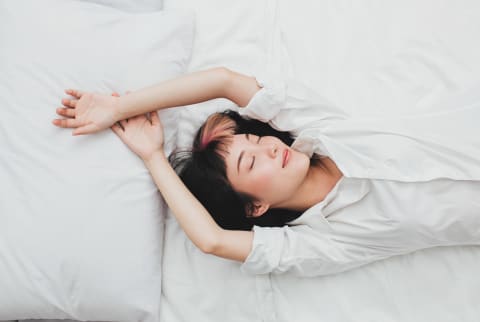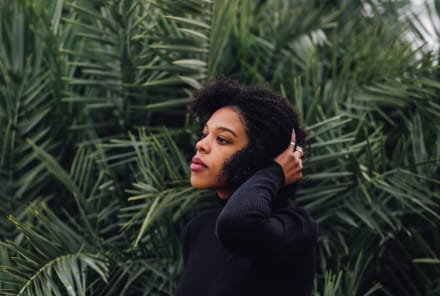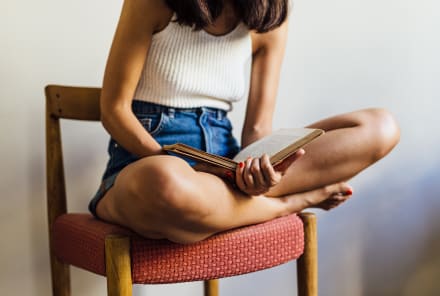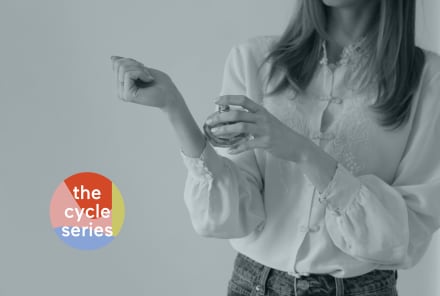Advertisement
This One Habit Could Reverse Your Sleep Problems In Just One Week


It's midnight, and I know I should be asleep. But instead of clocking some much-needed Z's, I'm glued to my Instagram Discover page with its myriad photos of made-up women on stunning vacations with cherub-faced babies. And when I finally do manage to tear myself away from my phone screen, I realize I'm still wide-awake. I know it's going to take at least another hour for me to fall asleep. Sigh.
Sound familiar? It should. Research shows American adults spend an average of 11 hours per day on screens. We also know screen time can trigger a hit of addictive dopamine, which is why most of us struggle to put our phones down. Add to that the fact that one in three U.S. adults1 don't get enough sleep, and you have a recipe for waking up on the wrong side of the bed more often than not.
But in a new study whose findings will be reported at the annual European Society of Endocrinology meeting in Lyon this month, researchers found there's an easy fix for this issue. It turns out, sleep can be improved in just one week by limiting your exposure to screens (including phones, tablets, and computers) before bed.
Why ditching your tech improves your sleep so quickly.
The study, which was conducted as a collaboration between the Netherlands Institute of Neuroscience, the Amsterdam UMC, and the Dutch National Institute for Public Health and the Environment, looked at screen time use in Dutch adolescents between the ages of 12 and 17. The researchers divided the group of teens into two groups: frequent screen users (those who clocked an average of four hours per day on screens) and infrequent screen users (those who looked at screens for about an hour per day). Then they looked at how those teenagers slept when they used their phones normally before bed, when they wore light-blocking glasses while using their phones before bed, and when they completely refrained from using any screens before bed.
After five weeks, researchers found the biggest sleep interrupter is blue light, which is emitted from screens of all kinds. Blue light can affect our brain clock by turning off the production of melatonin, which makes us feel like we aren't even tired. Thus, the researchers found using light-blocking glasses or curbing screen use altogether led to participants falling asleep 20 minutes earlier. The change was quick, too: The teens reported sleeping better after just one week of using the glasses or ditching screens before bed!
"Adolescents increasingly spend more time on devices with screens, and sleep complaints are frequent in this age group," Dirk Jan Stenvers, a researcher from the Department of Endocrinology and Metabolism of the Amsterdam UMC, said in a news release. "Here we show very simply that these sleep complaints can be easily reversed by minimising evening screen use or exposure to blue light. Based on our data, it is likely that adolescent sleep complaints and delayed sleep onset are at least partly mediated by blue light from screens."
The researchers plan to redo this study on adults next.
Falling asleep more quickly.
Sleep is important for so many reasons, but especially because a lack of sleep is associated with increased risks for obesity, diabetes, and heart disease. By improving your sleep hygiene, you can improve many other areas of your life.
Wondering what you'll do while lying in bed waiting to fall asleep without your phone? In addition to reducing screen time or wearing blue-light-reducing glasses before bed, holistic psychiatrist Ellen Vora, M.D., recommends making your bedroom a cave, with lowered temperatures and blackout shades to make it much easier for you to slide into a drowsy state once in bed.
"If I'm really wound tight, I'll take a few minutes to do a breathing exercise called 4-7-8 breathing," she also tells mbg. "I lie down on my bed, place my hands on my abdomen, then inhale for 4 counts, hold for 7, and exhale for 8. This hack can essentially trick the nervous system into believing you're not stressed, even if you are."
The more relaxed your brain is, the easier it'll be to slip into slumber.
Watch Next
Enjoy some of our favorite clips from classes
Enjoy some of our favorite clips from classes
What Is Meditation?
Mindfulness/Spirituality | Light Watkins
Box Breathing
Mindfulness/Spirituality | Gwen Dittmar
What Breathwork Can Address
Mindfulness/Spirituality | Gwen Dittmar
The 8 Limbs of Yoga - What is Asana?
Yoga | Caley Alyssa
Two Standing Postures to Open Up Tight Hips
Yoga | Caley Alyssa
How Plants Can Optimize Athletic Performance
Nutrition | Rich Roll
What to Eat Before a Workout
Nutrition | Rich Roll
How Ayurveda Helps Us Navigate Modern Life
Nutrition | Sahara Rose
Messages About Love & Relationships
Love & Relationships | Esther Perel
Love Languages
Love & Relationships | Esther Perel
What Is Meditation?
Box Breathing
What Breathwork Can Address
The 8 Limbs of Yoga - What is Asana?
Two Standing Postures to Open Up Tight Hips
How Plants Can Optimize Athletic Performance
What to Eat Before a Workout
How Ayurveda Helps Us Navigate Modern Life
Messages About Love & Relationships
Love Languages
Advertisement

Your Grandma's Go-To Supplement Is Once Again Popular (For A Good Reason)
Molly Knudsen, M.S., RDN

This Type Of Fat Is Vital For Women's Health — Are You Getting Enough?
Molly Knudsen, M.S., RDN

New Study Confirms The 3 Habits That Age Your Brain Faster
Molly Knudsen, M.S., RDN

Your Grandma's Go-To Supplement Is Once Again Popular (For A Good Reason)
Molly Knudsen, M.S., RDN

This Type Of Fat Is Vital For Women's Health — Are You Getting Enough?
Molly Knudsen, M.S., RDN

New Study Confirms The 3 Habits That Age Your Brain Faster
Molly Knudsen, M.S., RDN











